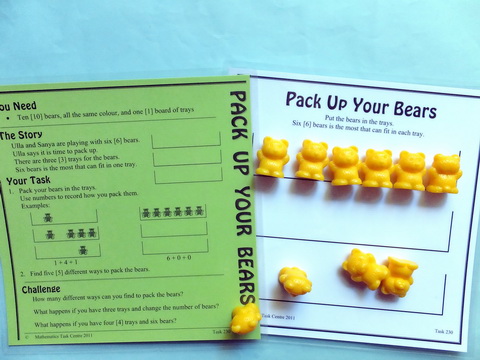
Pack Up Your BearsTask 230 ... Years 2 - 7SummaryAppealing to many children's experience of 'packing up neatly' the challenge is to find different ways of putting away the bears. The initial task is limited by having only six bears and three trays. The trays can take as many as six bears, but no tray has to be full. Simply and sweetly this task has children exploring sums of three numbers which add to six. But what happens if:
|
Materials
Content
|

IcebergA task is the tip of a learning iceberg. There is always more to a task than is recorded on the card. |
The examples shown for Question 1 are intended to answer questions about what is allowed before they are asked.
There are many answers to Questions 1 & 2. The double line on the card is a traditional task card signal to show your work so far to a teacher. It is important to check answers at this point to make sure the students are ready to tackle the challenges. Challenges
ExtensionReferring to the original puzzle:

or symbolic...
|______| + 2 + 1 = 6 |
Whole Class InvestigationTasks are an invitation for two students to work like a mathematician. Tasks can also be modified to become whole class investigations which model how a mathematician works. |
Many schools have sets of 'counting bears' so all that is needed to run the investigation as a whole class experience is to design a sheet with trays the right size. If you don't have bears, then use blocks or other objects. If you have Poly Plug use 2 red boards to make the trays and pack up the bears by plugging yellow/blue plugs into the gaps. The other advantage of this material is the ease of changing the size and number of trays.

A lesson (for younger children) could begin by choosing two students to show how they 'play with my six pretend bears'. Then introduce the trays and the packing up. Finally show how to record the packing up. You might use poster paper and markers, or a record in the students' journals, or provide an erasable mini-whiteboard. Then ask another pair of students if they would like to play with your bears. Repeat the process - which only takes one or two minutes.
A variation on the development of this class lesson which uses 5 bears and 3 trays that will take up to 5 bears each can be found in the Poly Plug & Tasks link. At this stage, Pack Up Your Bears does not have a matching lesson on Maths300. However Lesson 18, Addition Totals, involves finding all the pairs of numbers (2 trays) that sum to a given number and Lesson 36, Soft Drink Crates, involves packing soft drink cans into a crate using rules about odd and even numbers. |
Is it in Maths With Attitude?Maths With Attitude is a set of hands-on learning kits available from Years 3-10 which structure the use of tasks and whole class investigations into a week by week planner. |
Pack Up Your Bears is not in any MWA kit. However it can be used to enrich the Number & Computation kit at Years 3/4. |